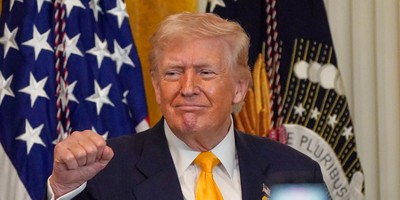Earlier today, President Trump -- with Vice President Pence by his side -- addressed the nation from the White House. Americans are still reeling from a bloody and horrible weekend, during which two young white males perpetrated appallingly lethal mass shootings on consecutive days. A white supremacist and anti-immigrant fanatic murdered 20 (update: now 21) people at a Walmart in Texas on Saturday, then a disturbed self-identified leftist killed nine on a busy city street in Ohio. The president forcefully denounced the "barbaric" violence, calling for unity and healing, and urging elected officials to take bipartisan action to help curb such spasms of mass violence. In case you missed his remarks, here they are in their entirety:
The president was right to describe this phenomenon as "domestic terrorism," pledging to deploy "any and all assistance required" from the federal government to aid the communities torn apart by this bloodshed. He also promised resources to "disrupt hate crimes and domestic terrorism," specifically mentioning monitoring internet forums in which extremists are radicalized and bred. The task, in which he enlisted government agencies and social media companies, is to "detect mass shooters before they strike." This is, needless to say, much easier said than done -- and also raises civil liberties questions. Trump also rightly singled out white supremacy and racism in his comments: "In one voice, our nation must condemn racism, bigotry and white supremacy," he said. "These sinister ideologies must be defeated. Hatred has no place in America." National Review's Sunday editorial -- entitled 'Crush This Evil' -- is profound:
The killer was the second gunman to cite Christchurch as an inspiration in the last six months. The perpetrator of the massacre at California’s Poway Synagogue — also a devotee of 8chan — made exactly the same claim in April. In the Internet era, malevolence tends to echo...If, as they should, the various providers that make websites such as 8chan possible decide that they no longer wish to do so, that is their prerogative. If, as they should, Americans take it upon themselves to spot the early warning signs of radicalization and do whatever they are able to discourage it, that is their prerogative. Here, as elsewhere, the best prophylactic against mass killings is individual intervention and social responsibility... Now, as ever, evil is evil and murder is murder, and we gain nothing by refusing to call them by their names.
Recommended
President Trump also embraced a proposal known as "red flag laws," which we've discussed in the past. Firearm-related mental health restraining orders, with expedited due process provisions, seem like a good idea. Here's how writer David French, a conservative constitutional attorney, described them last year:
It’s called a gun-violence restraining order, or GVRO. While there are various versions of these laws working their way through the states (California passed a GVRO statute in 2014, and it went into effect in 2016), broadly speaking they permit a spouse, parent, sibling, or person living with a troubled individual to petition a court for an order enabling law enforcement to temporarily take that individual’s guns right away...The concept of the GVRO is simple, not substantially different from the restraining orders that are common in family law, and far easier to explain to the public than our nation’s mental-health adjudications. Moreover, the requirement that the order come from people close to the respondent and that they come forward with real evidence (e.g. sworn statements, screenshots of social-media posts, copies of journal entries) minimizes the chance of bad-faith claims.
Trump specifically endorsed "extreme risk protection orders" with "rapid due process," then pivoted to calling for aggressive and expedited application of the death penalty for mass shooters. There are no easy ways to circumvent due process on this front, but I suspect that a fair number of death penalty opponents -- who, like me, oppose the practice due to concerns over wrongful convictions -- are open to pursuing this form of justice against hateful bigots who commit acts of terrorism, with their culpability not remotely in doubt. On the subject of gun regulations and restrictions, the president did not propose any new action, but smartly highlighted two steps already taken during his term in office; Trump signed a Fix-NICS provision into law last March, strengthening background checks, and took executive action barring 'bump stocks,' which were used to horrifying effect by the Las Vegas shooter. While progress may be limited and frustrating to many, the notion that "nothing" ever gets done isn't accurate.
The president's one false note, in my view, was echoing other officials in scapegoating video games. The evidence of linkage between violent games and violent actions is very weak to non-existent. In his speech, Trump signaled an openness to any ideas that "will actually work." This isn't one of them. Far more useful, I think, would be a collective agreement among media outlets (the government should not be involved) to severely limit mentions of mass shooters' names, and to largely suppress images of their faces.

























Join the conversation as a VIP Member